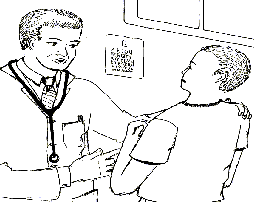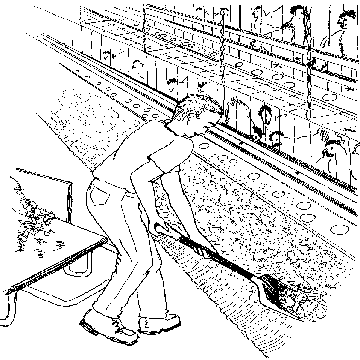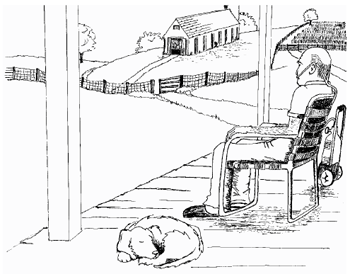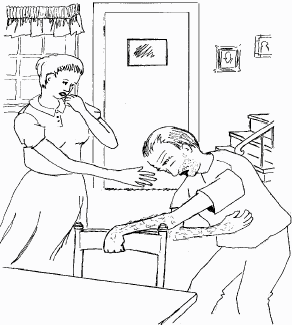Farmer's Lung - Narrative Simulation
Ben
Can't Breathe

Purpose
This simulation exercise is a story about a teenage boy who
grows up on a farm. The story is based on discussions with
many farm parents and children from Kentucky, Iowa, and Mississippi.
It includes information about farm economics, productivity,
health, and injury gathered by University of Kentucky researchers.
As participants complete the simulation, they interact with
each other and with the characters in the story. They make
decisions that can prevent a serious work-related health problem
for the character in the story. The exercise is designed to
teach participants the serious consequences of a common health
problem and the simple practices by which to prevent the problem.
Credits
This simulation exercise was initially developed in 1999 by
Pamela Kidd, Deborah Reed, Henry Cole, Daniel Rosnik and Tim
Struttmann at the Southeast Center for Agricultural Health
and Injury Prevention, the Kentucky Injury Prevention and
Research Center, and the University of Kentucky College of
Nursing under the United States Department of Health &
Human Services/United States Public Health Service/Centers
for Disease Control & Prevention/ National Institute for
Occupational Safety and Health (NIOSH) Grant #1 RO1 CCR414307
to the Southeast Center for Agricultural Health and Injury
Prevention, Deborah Reed, Principal Investigator. The views
and conclusions contained in the document are those of the
authors and do not necessarily represent the official policies
or recommendations of NIOSH, the University of Kentucky or
any department or agency of the government of the United States
or the Commonwealth of Kentucky.
Introduction
This
is a story about Ben, a teenage boy, who grows up on a farm
and becomes the farm operator. The story begins when Ben is
15 and ends when he is 55. As you complete this exercise,
you will interact with Ben and other characters in the story.
You will be asked to make decisions that can prevent a serious
work-related health problem for Ben. Many farmers develop
this health problem. We hope this story will help you to understand
the serious nature of this health problem and to take the
simple steps necessary to protect your own health.
Instructions
You should have three items to complete this simulation: A problem book, an answer sheet, and a pencil. Read the background information and problem situation described on the following pages. Next, answer each of the questions one at a time. Do not mark your answers in the problem book. When you have selected an answer to a question, look up its number on the answer sheet, and circle T if the answer is true or F if it is false. Some questions may have more than one true answer. Don't jump ahead. As you work the exercise, look at the background information about "Ben Can't Breathe" as often as you need to. It's okay to look back to earlier questions and answers, but please don't change your answers.
When
you have finished, you will learn how to score your answers.
You will also receive a master answer sheet that will explain
why each answer is true or false.
Ben at Age 15 Years
Ben is 15 years old. He lives on a 150-acre poultry farm. His family also grows about 50 acres of hay and alfalfa. Ben loves farming. He plans on taking over the family farm someday. Ben likes sports and is a good athlete. He's a running back on his high school football team.
Cleaning Out the Poultry House
After
coming home from football practice, Ben starts cleaning out
the poultry house. He shovels out and hauls away the wood
chips and chicken manure. Then he puts fresh chips below the
pens. This is one of his regular jobs. Ben says, "It's
hard work, but I like it, and it helps keep me in shape."

As Ben shovels out the poultry house he sees a lot of mold in the manure and wood chips. Soon the air gets very dusty. Because of the hard work, Ben soon is breathing hard, but he feels fine and gets the job done in a couple of hours.
Question A
What
are some things in the mixture of wood chips and chicken manure
that can get into the dust in the air as Ben shovels out the
poultry house?
(For each item, circle T or F on the answer sheet.)
When
Ben finishes cleaning out the wood chips he goes in for supper.
After supper he takes a shower and goes to bed early. When
he wakes up the next morning, he feels lousy. He's coughing,
having chills and has a fever. He gets scared when he notices
that he's really short of breath while walking to the bathroom
and getting dressed for school. His mom decides to take him
to the doctor. Ben is worried. There's a play-off game tonight
and the football team is counting on him.

Doctor Jones examines Ben, orders a chest x-ray and some blood
work. When the results are back, the doctor asks Ben, "What
did you do yesterday?"
Ben says, "It was a pretty normal day. I went to school, then to football practice, did my chores, ate supper and went to bed."
Doctor Jones asks, "What type of chores did you do?"
Ben says, "I cleaned out the poultry house."
Doctor
Jones asks Ben if he wore a mask or a respirator during the
cleaning. Ben says, "Heck no, why would I need something
like that?"
Doctor
Jones tells Ben, "The chicken manure and spilled grain
in the wood chips is a good place for mold and fungi to grow.
When you clean out the poultry house, spores from the mold
and fungi get into the air along with dust from the chicken
manure, uneaten feed, and bug droppings. The dust is filled
with these organic particles, tiny pieces of materials that
are or were once living things. When you breathe in this dust,
your body can react to these organic dust particles just like
it would to invading germs. You can have an allergic reaction
that makes you sick just as if you had a bad respiratory infection
or the flu."
Question B
The next time Ben cleans the poultry house, what are some things he can do to protect himself from breathing organic particles? (For each item, circle T or F on the answer sheet.)
9. Wear
a two-strap, NIOSH approved paper dust mask
10. Wear a half-face respirator with filter cartridges
11. Wet down the wood chips
12. Clean out the wood chips more frequently
13. Install a exhaust ventilation fan in the poultry house
14. Tie a bandana over his mouth and nose
Which of the following farm tasks puts a farmer at risk of breathing dangerous organic particles? (For each item, circle T or F on the answer sheet.)
15. Shoveling
grain for livestock
16. Using a combine during grain harvest
17. Shoveling out and disposing of the moldy top layer of
silage
18. Spreading manure
19. Preparing compost for fertilizer
20. Fueling a tractor
21. Baling and handling hay bales
It is now 30 years later. Ben is 45. He's married and has three kids. He's working the family farm and also holding a part-time job.
Ben has continued to do many dusty jobs on his farm. Even though he coughs and wheezes, he rarely wears a dust mask or a respirator. He says it is too much trouble and that the masks are hot and uncomfortable. Because his lungs are constantly irritated, he catches about six or eight bad chest colds every year and has had pneumonia 4 times in the last 6 years.
Mary, his wife, is worried about him because he's losing weight, coughing a lot, getting short of breath, and says he's tired all the time. Mary thinks he's not feeling well because he's been working too hard. She insists that he go see the doctor.
The doctor
sends Ben to a specialist. After an examination and some tests,
the specialist diagnoses Ben with Farmer's Lung (Hypersensitivity
Pneumonitis).
Question
D
What is Farmer's Lung? (For each item, circle T or F on the
answer sheet.)
22. Pneumonia
23. A form of lung cancer
24. A chronic disease that results from inflammation of the
airways and air-sacs in the lung
25. A chronic form of emphysema found in smokers who work
on farms


26. Mary
may have to get a job in order to make ends meet
27. Ben should think about writing a living will and signing
a paper that explains his treatment wishes
28. Ben and Mary may lose the family farm
29. Ben may have to retire from farming
30. Ben may become bedridden as his disease progresses
31. Ben will have to wear an air-purifying respirator to breathe
End of the story
Back
to Contents
This curriculum guide was supported by Grant Number 1 R01/CCR414307 from NIOSH. Its contents are solely the responsibility of the authors and do not necessarily represent the official views of NIOSH. Special thanks to Dr. Ted Scharf.
Disclaimer and Reproduction Information: Information in NASD does not represent NIOSH policy. Information included in NASD appears by permission of the author and/or copyright holder. More